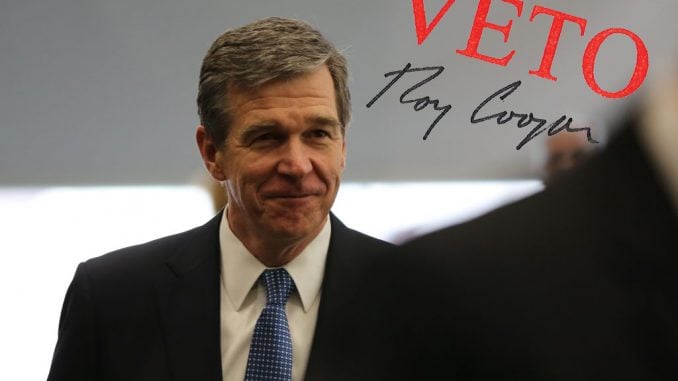
RALEIGH — Gov. Roy Cooper vetoed a bill on Wednesday that addressed potential unlawful voting in North Carolina by non-citizens but signed another that strengthens mail-in absentee balloting rules following evidence of fraud in a congressional race last year.
The vetoed measure would have required North Carolina courts to send information about potential jurors being disqualified because they aren’t U.S. citizens to election officials for their removal from voter rolls.
There would be an administrative process before a county board could remove the registered voter, who also could challenge any such action. While only citizens should be allowed to vote, Cooper wrote in his veto message, the measure would increase the risk that legitimate citizens will be denied the right to vote due to bad jury-excusal information.
“This legislation creates a high risk of voter harassment and intimidation and could discourage citizens from voting,” Cooper said.
GOP legislators say the mechanism is a common-sense plan to ensure only citizens are voting. Some pointed to federal charges filed last year against 19 foreign nationals accused of illegal voting. Several were accused of falsely claiming U.S. citizenship.
“With strong bipartisan concern for the security of our elections systems across the country, North Carolinians deserves an accountable elections process that guarantees every vote will count equally and fairly,” said Rep. George Cleveland, an Onslow County Republican who shepherded the final bill. “We are immensely disappointed the governor opposes this shared priority.”
It’s unlikely Republicans will be able to override the veto, since the measure was passed along party lines. Republicans would need several Democrats to go against the wishes of Cooper. None of Cooper’s 10 vetoes in 2019 has been overturned.
Lt. Gov. Dan Forest (R), who is seeking the Governor’s mansion in 2020, called Cooper’s veto “reckless at a time when so many are concerned about foreign interference with our elections.” Forest said he believed that only citizens should be allowed to vote. “If a person tells a judge that they are not a citizen and therefore not able to serve as a juror, they should be removed from our voter rolls,” said Forest.
The signed absentee ballot bill is largely a response to the State Board of Elections probe into the 9th Congressional District campaign in 2018, which led to a new election this September. The board uncovered evidence of illegal ballot “harvesting,” including the collection of blank or incomplete ballots and forged signatures on them. A political operative working for the 2018 Republican nominee and several workers now face criminal charges.
In a news release, Cooper focused on an unrelated provision in the bill that restores permanently early in-person voting on the last Saturday before elections. That’s something Republican lawmakers tried to end last year, but ultimate returned it for the November 2018 election only. Early-voting sites in all 100 counties will now be open from 8 a.m. to 3 p.m. on that final Saturday, which has been traditionally a popular voting day.
“This will help reduce long lines on Election Day and make it easier for people to have their voices heard,” Cooper said.
Cooper said he signed five other bills on Wednesday, including one to let utilities issue bonds to pay for storm recovery costs and another to offering loans to rural hospitals that are struggling financially.


